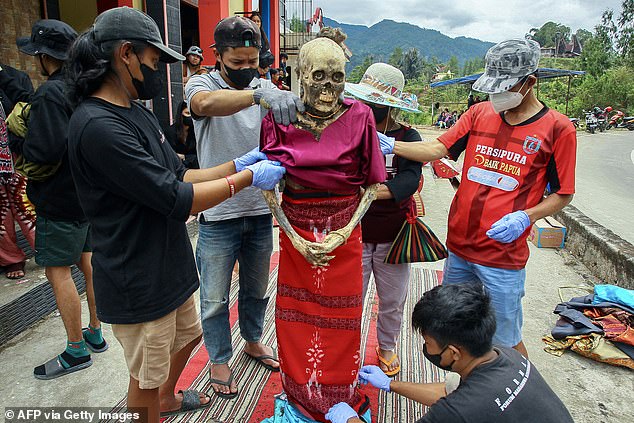A Clean Death: Corpses are taken from their graves so that they can be cleaned up by their loved ones and given new clothes, as part of Indonesian tradition

- The Toraja people dig up their loved ones and care for their bodies
- Their coffins are cleaned and they are given clean clothes
- The ceremony takes place approximately every four years
Mummified ancestors of an Indonesian rural tribe have been excavated, restored and put on display as part of an elaborate burial ritual.
Every four years, the Toraja, a people living in the center of the archipelago in South Sulawesi, dig up the graves of their ancestors and carefully care for their bodies.
The bodies are exhumed, cleaned, dried in the sun to extend their lifespan, and re-clothed in their new clothing in a ceremony known as Ma’nene, which means “care of the ancestors” or “cleaning the corpse.”
Video footage from Liang Lo’ko’ Kuku, a small town where the Toraja people live, shows them crowding around stone graves and traditional Toraja tombs and digging their coffins out of the ground.
Villagers were spotted posing with their deceased ancestors, who had dry, papery skin after spending years in the ground.

Mummified ancestors of an Indonesian rural tribe have been excavated, restored and put on display as part of an elaborate burial ritual

Every four years, the Toraja people dig up the graves of their ancestors to carefully care for their bodies

The bodies are dug up, cleaned, dried in the sun to extend their lifespan and re-dressed in their new clothes.
A man was seen stroking the head of a dead man. The dead man was so well preserved that his hair was still visible.
We then saw villagers placing the bodies of their relatives back into their coffins, dressed in new, modern clothes.
While many wore traditional sarongs, a long strip of cloth popular in South and Southeast Asia, many also wore modern sunglasses and belts.
The ceremony takes place in Toraja villages in the region throughout the month of August.
According to HeritageDaily, the Toraja do not view death as a one-time event, but as a gradual transition of the soul to the afterlife.

A member of the Toraja ethnic group opens the grave of his relatives during the traditional ritual known as Manene in Pangala, South Sulawesi, on August 27, 2024

The ceremony takes place in Torajan villages in the region throughout the month of August

Villagers were seen posing with their dead ancestors, who had dry, papery skin after spending years in the ground

A member of the Toraja ethnic group holds the exhumed body of her baby who died in 1988, during the traditional ritual known as Manene in Pangala, South Sulawesi, on August 27, 2024
Therefore, they believe that care is still needed for the bodies of recently deceased people.
According to the New York Times, locals believe the ceremony began with a local hunter named Pong Rumasek, who lived hundreds of years ago. However, the authenticity of this myth is questionable at best.
It is said that he found an abandoned corpse in the jungle. Moved by the fate of the stranger, he took the dead body under his care and dressed it with his own clothes.
From then on, Pong was blessed with great luck and abundant hunts and harvests.




